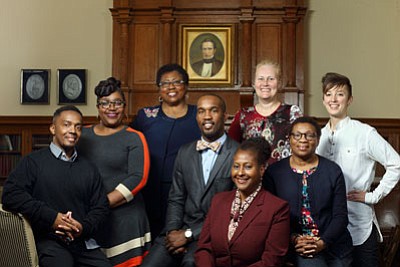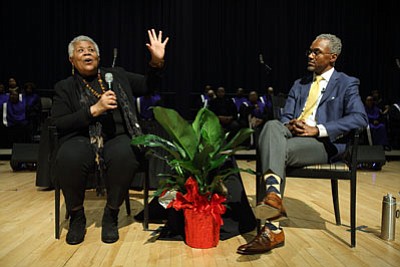A historic part of the legendary Civil Rights Movement was in Baltimore recently for the 36th Anniversary Martin Luther King, Jr. Commemoration program held January 19, 2018 at Johns Hopkins Hospital’s Turner Auditorium. Minnijean Brown Trickey of the famed “Little Rock Nine” was the keynote speaker for the event.
The Little Rock Nine collectively resisted opposition to the desegregation of Little Rock Central High School in 1957, with protection from federal troops. The teens’ courageous act took place three years after the Supreme Court ruled in the Brown vs. Board of Education case that racial segregation in public schools was unconstitutional.
Courtesy Photo/Johns Hopkins Medicine
Minnijean Brown Trickey responds to a question from James Page, Chief Diversity Officer and Vice President of Johns Hopkins Medicine.
During the program, footage of the students making their way into the school under the protection of federal troops was shown.
James Page, Chief Diversity Officer and Vice President of Johns Hopkins Medicine asked Brown Trickey questions in a “conversation-like” setting in front of the packed auditorium. They included one question posed by students from Commodore John Rogers Elementary & Middle School. Thirty students from the school attended the event with their teacher Jamie Cassermere.
The question was: “Were there times when you wished you weren’t black, so you wouldn’t have to go through what you were dealing with? If so, can you tell us when? If not, why?”
Brown Trickey responded: “No American magazines had my images in it except Ebony and Jet. So it was up to my mother and other women to assure me that I was beautiful, that I was smart, and I was special. That’s a lot of work. I have six kids. I really thought I was beautiful. But that came from home and that came from my friends. In a segregated society, we were engulfed with where we couldn’t go. We didn’t go places where we couldn’t go. Instead of riding the bus, we walked.”
She added, “My dad’s business was based on white people, because he was a landscaper, stone mason, and whatever other stuff he did. That was really an important thing because I was never taught anything about hating white people. We didn’t have time for hate. We only had time to deal with how important I was, and how special I was.”
Referencing back to American magazines of that time that did not publish her image, nor perhaps images of any person of color, Brown Trickey said to resounding applause, “I never thought I wanted to be white, but I did want to see my own image. The Little Rock Nine cracked that one.”
Page talked about having the opportunity to sit with Brown Trickey.
“Of course, the civil rights leaders were people too – some of them children,” said Page. “Minnijean Brown-Trickey was only sixteen – the age my daughter is now – when she stood up to bigotry in order to desegregate Central High School in Little Rock, Arkansas. I can’t imagine the bravery that must have taken. And yet, after having the chance to sit down with Ms. Brown-Trickey, and seeing her charm, her approachability, and, more than anything, her humbleness, she reminded us that each of us can be a part of history. As Ms. Brown-Trickey so eloquently put it, it is ‘little rocks that can make big avalanches.’”
The event featured musical performances by Unified Voices of Johns Hopkins (UV), and a reception.
Levi Watkins, Jr., M.D. was presented with the Ideals Award. The Martin Luther King, Jr. Community Service Award was presented to Hopkins employees making exemplary contributions to their communities. They were: Renee Blanding; Darren Brownlee; Ariel Hicks; Carrie Holdren-Serrell; Rhonda Johnson; and Darcenia McDowell.
Brownlee is an assistant administrator with Johns Hopkins Hospital and Bayview Medical Center. He mentors to Baltimore youth through the Big Brothers and Big Sisters program.
“In this city and others, there aren’t that many black male mentors,” said Brownlee. “When the challenge and task was asked to mentor, I knew that’s what I wanted to do, I wanted to pay it forward. My Little Brother is 16, and his name is Khiree. He was like the little brother I never had. I know that one day, he will do the same.”
He added, “I was really inspired by Ms. Brown Trickee’s experience and humility. She talked about how we are seeing some of the same things today. That puts me into place to do what I can do and what I should do. It also points out what we can do together to be of service to others and change our nation. Even today, she is still fighting for change, service, non-violence and activism. That is something that resonated with me and I plan to move forward with it.”

